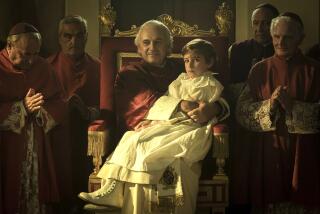Longing for human connection
- Share via
Giovanna (Giovanna Mezzogiorno) and Filippo (Filippo Nigro), a married, working-class couple, quarrel as they run errands in downtown Rome. They encounter an old man (Massimo Girotti) who’s forgotten his name and where he lives. Against Giovanna’s wishes, they take him home, with Filippo promising to deliver him to the neighborhood police station and file a report.
The old man’s story gives “Facing Windows,” Ferzan Ozpetek’s clear-eyed romance, its structure. The film opens in 1943 in a cavernous bakery where a young man kills another man in a struggle. He runs into the dark, empty streets fleeing an unknown terror. Ozpetek then transitions to the present, where we pick up Giovanna and Filippo as they relentlessly grill one another.
The presence of the old man increases the tension in the couple’s relationship, and one night Giovanna leaves in a huff, intent on taking him to the police station herself. When she stops off at a friend’s pub to drop off cakes she has baked, the old man wanders off. A handsome neighbor, Lorenzo -- “Under the Tuscan Sun’s” Raoul Bova -- helps Giovanna locate him, and a tentative relationship, ostensibly based on learning the old man’s identity, begins.
Lorenzo lives in the apartment opposite the one Giovanna shares with Filippo and their two children. Unbeknown to one another, Giovanna and Lorenzo have each been watching -- and lusting after -- the other for months through their facing windows.
Sassy Turkish friend Emine (Ozpetek regular Serra Yilmaz) encourages Giovanna’s longing for Lorenzo, as the young wife feels increasingly unfulfilled by her accounting job and agitated by Filippo’s inability to hold a job.
As pieces of the old man’s past, including his name, Davide, are revealed, Giovanna’s mistrust of him gradually melts away. They discover a mutual enthusiasm for baking and share a moonlit dance, and the realities of past and present blend as Davide desperately tries to remember the details of his life.
Ozpetek and co-writer Gianni Romoli’s multilayered script loses its way at times, especially with Giovanna and Lorenzo’s awkward romance. The character of Lorenzo, a banker on the brink of a promotion, is underwritten, and Bova’s low-wattage performance makes him seem a little creepy. Even some of Ozpetek’s stylized attempts to overlap the realities of the present with Davide’s memories fail to make the necessary emotional connections.
However, the film is redeemed by terrific performances by Mezzogiorno and especially Girotti, who died in January 2003 at age 84. Mezzogiorno, perhaps best known in the U.S. for her role in the lightweight Italian romance “The Last Kiss,” is soulful and determined as the frustrated Giovanna, infusing her with a smoldering, yearning desire to live a more meaningful life.
Girotti skillfully underplays as Davide, a stoic man carrying a heavy burden. His deep-set eyes and craggy features render the impenetrability of his memory with intense sorrow. In a role that could easily have been reduced to maudlin sentimentality, Girotti is a marvel.
Ozpetek, known for small films such as “Steam: The Turkish Bath” and “His Secret Life,” takes on a more complex story here with more resonant ideas. “Facing Windows” is ultimately about the importance of creating and maintaining memories of the people we meet.
It might be easy to dismiss these as obvious platitudes if it weren’t for the deep conviction Ozpetek and his actors bring to the work. Far from a simple, feel-good story of self-discovery, “Facing Windows” delivers a challenging examination of loneliness and human interaction.
*
‘Facing Windows’
MPAA rating: R for language and some sexuality
Times guidelines: Adult situations, brief nudity and some violence
Giovanna Mezzogiorno...Giovanna
Massimo Girotti...Davide Veroli
Raoul Bova...Lorenzo
Filippo Nigro...Filippo
Serra Yilmaz...Emine
A Sony Pictures Classics release. Director Ferzan Ozpetek. Producer Tilde Coris, Gianni Romoli. Screenplay by Gianni Romoli and Ferzan Ozpetek. Cinematographer Gianfilippo Corticelli. Editor Patrizio Marone. Costume designer Catia Dottori. Music Andrea Guerra. Art director Andrea Crisanti. Set decorator Massimiliano Nocente. Running time: 1 hour, 46 minutes.
In selected theaters.
More to Read
Only good movies
Get the Indie Focus newsletter, Mark Olsen's weekly guide to the world of cinema.
You may occasionally receive promotional content from the Los Angeles Times.











